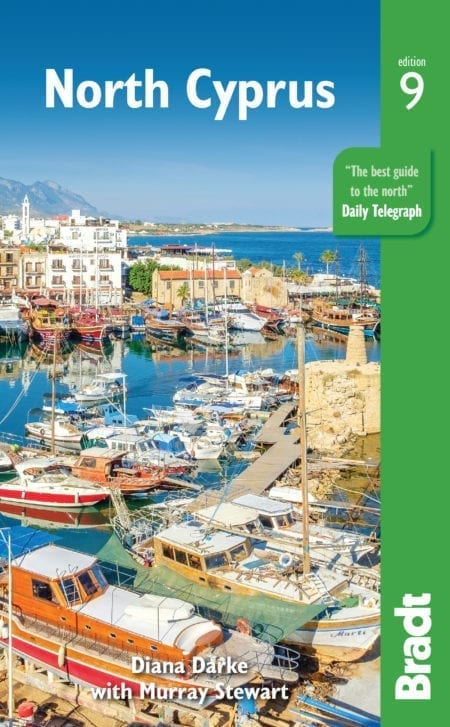For now, it’s still possible to leave the main population areas behind and discover that the rural, tranquil charm of North Cyprus remains in place. Over the mountains from Girne and out in the Karpas, goatherds tend their flocks and the menfolk sip sweet tea between vigorous games of backgammon.
Diana Darke and Murray Stewart, authors of North Cyprus: the Bradt Guide
The northern, Turkish-speaking part of Cyprus – 37% of the island’s territory – still remains much less visited than the Greek south. No-one denies that when the island was divided in 1974, the Turks took the more beautiful and fertile region, but while holidaymakers jostled for beach space at Paphos and Limassol, for many years it was a case of spot the tourist at Girne (Kyrenia) and Gazimağusa (Famagusta). The Greek Cypriots are skilful political lobbyists and since 1974 have conducted an effective boycott of the north, presenting it as ‘occupied and inaccessible’. They have done an excellent job, as both the economy and tourist industry in the north have stagnated and continue to suffer to this day. To start with, only an initiated few saw through the propaganda and went to find out for themselves, becoming loyal devotees who return each year to enjoy the wealth of cultural sites, beaches and the relaxing – and very different – atmosphere.
For better and for worse, times have changed and are still changing. With the establishment of nine border crossing points to date, more flights into Ercan, EU money starting to filter through to improve infrastructure, and an economy supported by Turkey, the north is no longer an isolated backwater. Admittedly, North Cyprus’s tourist economy still suffers from a complete ban on direct flights from anywhere other than Turkey, but the enthusiastic construction of ‘casino’ hotels has ensured a continuing flow of Turkish visitors from the mainland. Add to this a loyal band of European and other visitors and you have the makings of a healthy tourist industry.
For now, it’s still possible to leave the main population areas behind and discover that the rural, tranquil charm of North Cyprus remains in place. Over the mountains from Girne and out in the Karpas, goatherds tend their flocks and the menfolk sip sweet tea between vigorous games of backgammon.
Ensuring that its natural environment is maintained and the genuine welcome of its people is not diminished by exposure to the negative aspects of increased tourism remains firmly the responsibility of visitors – we can all do our part in keeping North Cyprus special. Turkish Cypriots are always warm and respectful hosts, but visitors who reciprocate will be the ones who benefit most.
North Cyprus remains perpetually at a crossroads, and may do so for many more years: it is still ‘another country’ and, for the inhabitants of a divided island, identity is understandably an emotive issue. Turkish-speaking Cypriots possess a distinct ethnicity together with their own cultural and religious traditions. Waves of immigration from Turkey, an influx of guest workers from the Indian subcontinent and Asian and African students attending the universities, together with emigration by Turkish-speaking Cypriots to the UK and elsewhere – followed by their return – have seen Turkish-speaking Cypriots reduced to a minority in their own land. However, though the Turkish Republic of North Cyprus is only recognised by Turkey and the economic and cultural links are plain for all to see, it is definitely not the same country.
For more information, check out our guide to North Cyprus
Food and drink in North Cyprus
Food
The range of food and restaurants on offer in North Cyprus, especially in and around Girne, is enormous, from Turkish Cypriot cuisine to Chinese, Indian, Italian and French. For those who prefer home favourites, ‘British’ food is very widely available in the Girne/Lapta area. You can snack on a doner kebab from a street stall or savour dinner at a chic restaurant that can hold its own with top restaurants in Europe. Whichever cuisine you choose, standards are generally very good, as is the value for money.
Most local specialities will be familiar to visitors to Turkey – various meze (selection of hot and cold appetisers), börek (hot pastries stuffed with spinach, cheese or meat), kebab, kofte (spiced meatballs), dolma (stuffed vine leaves) and salads that feature aubergines, tomatoes, onions, cucumbers, peppers (sometimes very hot), watercress, parsley, radishes and olives. Ordering a ‘full kebab’, which is available at many places, will result in a seemingly endless stream of delicious dishes being delivered to your table. A Cypriot speciality – though not found on many menus – is molohiya, which is a spinach-like vegetable cooked with lamb or chicken. Pilavuna is an oven-baked pastry made with talar cheese, eggs and milk. Cypriot pasta can look a little insipid compared with its Italian cousin, but is nevertheless delicious.
Freshly caught fish and seafood are widely offered, and include red and grey mullet, lobster, crab, mussels, bream, squid and sea bass. Fish is usually simply cooked, grilled or fried, though a few more sophisticated places offer it prepared in special sauces or as tasty casseroles. A fresh fish meze is a culinary highlight. Specifically Cypriot is the halloumi (or hellim) cheese, with that wonderful rubbery texture, often served grilled as a very tasty meze. There is also the crumbly white goat’s cheese, and thick creamy yoghurt (excellent on meat, mixed with herbs, or as a dessert, drizzled with local mountain honey). Good-quality fresh fruit according to season includes melons, cherries, apples, strawberries, bananas, figs, grapes, oranges, grapefruits and pears. Turkish delight is available in a variety of flavours, and those with walnuts or pistachios inside are especially delicious.
Drink
To wash it all down, there’s the cheap and widely available mineral water and the usual range of fizzy drinks, as well as delicious Cyprus lemonade (made from mandarins and lemons). Ayran (yoghurt drink) is cheap and also popular.
On the alcoholic front, the Turkish Efes beer is very good. A local beer, Goldfassl, previously produced in Gazimağusa, is no longer available. Wine is inexpensive in the big supermarkets and in a couple of specialists on the main road between Alsancak and Lapta, and there is an ever-increasing range of European and New World wines to supplement the local and Turkish favourites. In restaurants, ordering a bottle will certainly bump up the bill quite considerably. Local wines are greatly inferior to those from the Turkish mainland, as wine-making is a recently acquired skill in the north. A new winery offers some hope for the future, though. Of the mainland wines, those that are consistently the best are by Kavaklidere and Doluca. Kavaklidere produce the red Yakut, the white Çankaya and rosé Lâl. Doluca produce the red and white Doluca and the more upmarket red Villa Doluca. Buzbag is another well-known brand.
Many hotels and bars claim to make the best Brandy Sour, Cyprus’s signature cocktail, a combination of mild local brandy and lemon juice: do try one during your stay. Raki is the favoured spirit, clear and aniseed flavoured, drunk either neat with ice or mixed with water, when it turns cloudy, thus explaining its description as ‘lion’s milk’. It goes well with meze, fish and lamb. The Turkish raki is better than the local raki, for the same reasons as the wine. Then there’s the Turkish Cypriot version of grappa, zivana, and if you are feeling brave, Turkish Cypriot brandy and even something that is shamelessly marketed as whisky, distilled in Gazimağusa. Turkish coffee is widely drunk, introduced here, as elsewhere in the eastern Mediterranean, by the Ottomans in the 15th century. It is drunk sade (without sugar), orta (medium sugar) or şekerli (heavily sugared).
Increasingly, more Western-style coffees are becoming available, and you should be able to find your favourite cappuccino or latte in the major towns. Otherwise, be aware that instant coffee is often the standard alternative offering to Turkish coffee. Tea (çay) is also popular with locals, served in small glasses and – unlike in some Middle Eastern countries – not usually pre-sugared. ‘English’ tea is also widely available at hotels, and is offered up as the standard in more touristy establishments.
Health and safety in North Cyprus
Health
All visitors are entitled to free emergency medical treatment at state hospitals, and all blood banks have been HIV screened. Many expat residents and visitors praise the quality of the medical care they receive. Note that at present there is no state system of GPs, though this is being mooted for the future. Chemist shops (Turkish eczane) are also capable of recommending medicines for common holiday illnesses, and many drugs such as antibiotics are available cheaply over the counter, with no need for prescriptions. Note that every edition of the English-language Cyprus Today newspaper lists duty chemists.
As the south part of the island is a full member of the EU, a short hop across the border will allow you to use the reciprocal rights bestowed by your EHIC (European Health Insurance Card), should you carry one. The EHIC is not valid in North Cyprus.
The Kolan British Kyrenia Medical Center is a private GP clinic, accessible to all. Visitors pay TL160 for the initial consultation, but any follow-up advice is then without further charge for the following 15 days. They also have a hospital in Lefkoşa, an emergency service at Ercan Airport and their own ambulances. For contact details of other doctors, use the online directory of the North Cyprus-based Buzz magazine.
Vaccinations
No vaccinations are required for North Cyprus. However, as with any trip abroad, it is recommended that your tetanus, diphtheria and polio vaccinations are up to date. This is also true of measles, mumps and rubella vaccinations. Two injections given at least one month apart are advised. Most people will have had this as part of their baby immunisations.
Hepatitis A vaccination may be recommended for longer trips where good food and water hygiene cannot be guaranteed, or where there may be an increased risk through lifestyle or occupation. The vaccine (eg: Havrix Monodose, Avaxim) can be given even up to the day before travel and lasts for one year. A booster dose given at least six months after the first dose will extend cover for approximately 25 years. Foreign nationals intending either to work or study in Cyprus are required to undergo an HIV test. For those working in a medical setting or with children, a hepatitis B vaccine would be advised. This three-dose course can be given over 21 days when time is short for those aged 16 or over. If there’s more time available (at least eight weeks), then a longer course is preferred and is essential for those under 16. There is no reciprocal healthcare with Britain, so adequate medical insurance is strongly recommended.
Rabies is only found in the bat population, so if you wake with a bat in your room or think you have been bitten through close contact, seek medical advice as soon as possible.
Safety
The atmosphere in the north is very relaxed and friendly. The Turkish Cypriot people are by nature easy-going, and violent crime is very rare. The aggravating hassling of foreigners by street sellers and shop owners, rampant in other parts of the Mediterranean, is blissfully absent here. If you ask for help, it will be offered willingly, but if you are just strolling and looking, you will be left to yourself. On Girne’s harbourfront, a waiter or two may try to entice you into his establishment, but it gets no worse than that. Women alone are not propositioned and it is generally quite safe to walk around after dark. Your privacy is respected and people keep their distance.
Female travellers
For foreign females, North Cyprus should be a relatively relaxed destination. Expat women and tourists report that they feel entirely safe walking around on their own after dark, there is no harassment of lone women and as a tourist destination it is untainted by the sort of expectations raised by the licentious behaviour of some visitors to other parts of the Mediterranean. Here it’s all about sun, sea and sand, not sun, sea and sex.
Levels of crime against people are very low. Having said that, the usual precautions should be taken. The ‘entertainment’ spots to avoid are the seedy nightclubs that inhabit the roadside in usually out-of-town locations. These are basically lap- dancing joints, with prostitutes available for those who want them. It’s unlikely that female visitors would stumble into one of these, but most would be uncomfortable if they did so. (And many men, too!) There are also a couple of ‘motels’ in the old part of Girne that also seem to have an alternative, seedy purpose.
Travelling with a disability
Wheelchair users will find that North Cyprus is not the most user-friendly of places. Investment in infrastructure to accompany increased tourism in recent years has led to better pavements, for example, but they are still far from easy to use and are also frequently used for the parking of cars. Some newer hotels have installed ramps to allow access to bedrooms and public areas, but the situation is far from perfect.
The Buzz magazine, which is online and also published quarterly, is freely available in bars and cafés and lists all the Girne restaurants, indicating whether or not they cater for wheelchairs. It’s probably best to ask at the time of booking, if you have any particular concerns. Taxis are usually Mercedes saloon cars, comfortable and spacious for the able-bodied, but not much use for those with limited mobility. Similarly, dolmuş (public minibuses) do not adapt for wheelchairs.
LGBTQ+ travellers
Despite the region being nominally Islamic, homosexuality and bisexuality are far from unknown in North Cyprus and are – generally, at least – tolerated.
Cypriots and Turks are very tactile people, and you should not be surprised to see men hug and kiss each other (on the cheek) in public, so nothing in particular should be read into this. Ironically, other displays of public affection – such as kissing on the lips – even between straight partners, are frowned upon.
North Cyprus became the last place in Europe to decriminalise homosexual acts, when it voted in 2014 to repeal the relevant statutes that outlawed them. This resulted from many years of lobbying from various pressure groups. Changing some attitudes can, of course, take longer than changing legislation, so perhaps the best advice is still to keep overly passionate displays of your sexual tendencies, whether heterosexual or homosexual, low key when in public places. It is currently not possible to have a civil ceremony or same-sex marriage in North Cyprus.
When to visit North Cyprus
Climate
North Cyprus is a year-round holiday destination, but unless you are a fan of extreme summer heat or cool winters, spring and autumn are the best times to visit. In recent years, the increasing numbers of visitors in these ‘shoulder seasons’ have ensured that prices remain almost as high as in summer. From late February until late April the island comes alive with thousands of colourful flowers, and in March and April the air is infused with the scent of citrus blossom. Rain is virtually unheard of between June and mid-September, with the midsummer months of July and August sending the mercury soaring, sometimes pushing towards 45°C.
The rainy season generally lasts from November until February, although occasional showery days do occur in October and even more so in March. December and January are the wettest months, while January and February are the coldest. April and May can yield terrific rainstorms, but you never have to wait for more than a day or two before brilliant sunshine breaks out again. If you are considering a winter visit, bear in mind that some hotels and visitor-orientated services may be closed from October to March. This is also the favoured season for restoration work on historic buildings.
North Cyprus enjoys hot, dry summers that last from June to September. Visitors can expect more than ten hours of sunshine daily, and virtually no rain, during these months. The air is humid between June and October, particularly so in July and August. By contrast, winter can be wet, particularly in December and January: annual rainfall is around 45cm. Rivers that fill up during the wet months will be dry throughout the summer, when reservoirs lie empty. January and February are particularly cold. Snow can fall on the higher parts of the Kyrenia Mountains, but very rarely lower down.
Festivals and public holidays
North Cyprus is well provided for in terms of festivals, and while you won’t find anything on the scale of Rio at carnival time, a visit to one or more of the events – taking place largely between March and December – will enrich your visit to the area and give you a better understanding of North Cypriot life and traditions.
The tourist board publishes a brochure of events each year, which you can obtain from any of the tourist information offices. It lists only the months in which the festivals occur, not exact dates, as many of them are dependent on the flowering or ripening of flowers or fruit and they can therefore only be finalised a few weeks in advance. Nevertheless, it is worth enquiring as to what is coming up, perhaps as soon as you arrive in North Cyprus. Some of the better-known events are described below.
Tulip festivals are held in both Tepebaşı and Avtepe in March, to coincide with the flowering of the Tulipa cypria, the dark crimson flower endemic to Cyprus. Although the flower is ostensibly the main event, it provides the two villages with an excuse for a bit of music and dancing, stalls serving traditional delicacies and handicrafts, and a few speeches by visiting dignitaries. The tulips themselves are protected, and to see them you’ll have to wander through some of the neighbouring fields. The sight of a small crowd of local people engaging in this ‘tulip hunt’ is in itself a novelty. A festival celebrating the orchid is held on the last weekend of March in the village of Hisarköy.
Esentepe holds a lively apricot festival, usually during the last week of May and first week of June. It’s a great chance to see colourful costumes and dancing, and to listen to traditional music late into the night. And to eat apricots, of course.
Also in May and June are the International Bellapais Music Festival, which showcases performances in the spectacular setting of the abbey, and the walnut festival in Lefke.
The Girne area celebrates its olive festival in October. It’s held in the little village of Zeytinlik, a few kilometres to the southwest of town, and lasts for nearly a week. It features all types of music from teen orchestras through to Turkish pop, with a dash of folk and Latin on the way. As well as the music, there are folk dance displays, darts and table tennis tournaments, free nibbles, plays, processions, olive branch burning and basketball competitions. And, of course, a chance to taste and purchase olives and olive oil.
Güzelyurt has an orange festival in June and there are folk dancing festivals, usually in July, in İskele, Lefkoşa and Gönyeli, while Mehmetçik hosts its grape festival in August.
Further east, the small village of Büyükkonuk justifies its status as North Cyprus’s first eco-village with two lively ‘Eco-day’ festivals, one in May and one in October. A day packed with folk dancing, music and speeches, as well as demonstrations of how to make baskets, olive bread, straw toys and headscarves, together with broom-tying, this is a true village festival that makes for an enriching experience. Up to 100 stalls now participate. Canadian Lois Çemal is one of the main movers behind the festivals and will be happy to advise of the festival dates.
The celebrated International North Cyprus Music Festival takes place in September/October, spread between Girne, Bellapais and Gazimağusa, with mainly classical music.
While many of the festivals are fairly recent in origin, they are often promoting and keeping alive age-old skills and traditions. Perhaps due to the scant information available from the tourist offices, foreign attendees are scarce, though happily increasing, but the locals will welcome you if you make the effort to attend.
What to see and do in North Cyprus
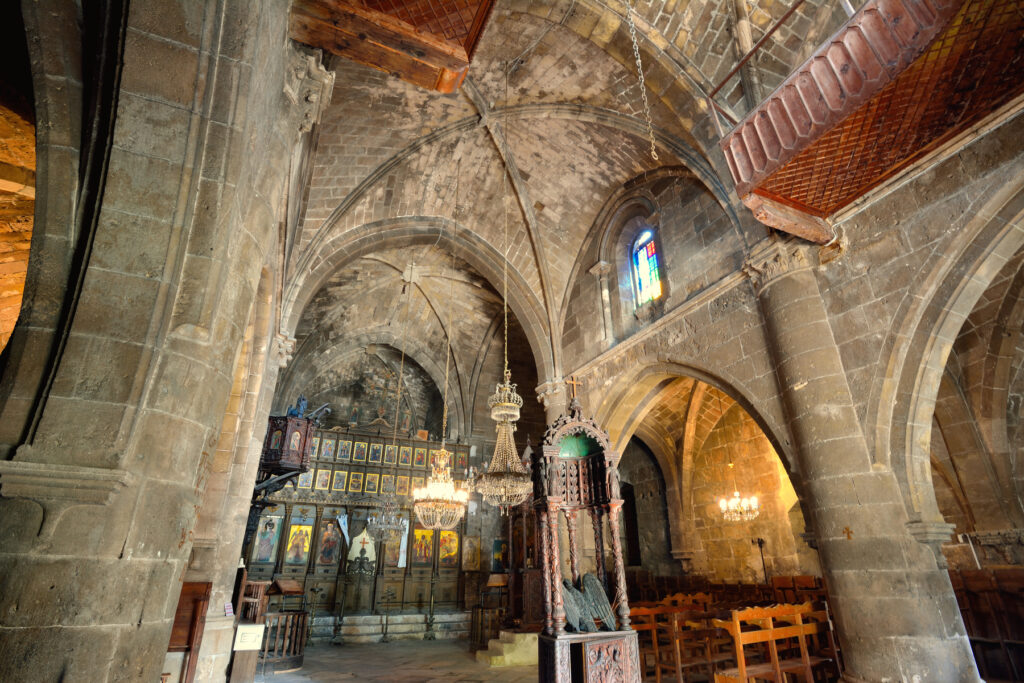
Bellapais Abbey
The beauty of Bellapais is legendary; when Lawrence Durrell bought a house here, he felt ‘guilty of an act of fearful temerity in trying to settle in so fantastic a place’. Set in the foothills of the Kyrenia Mountains just 10 minutes southeast of Girne, the mainly 13th-century Crusader abbey is a must-see during any stay in North Cyprus. A well-timed, early morning visit to avoid the crowds will allow you to fully soak up the tranquillity and enjoy the panoramas over Girne.
Those who knew Bellapais before the 1950s speak disparagingly of the encroaching commercialisation of the abbey. There are indeed several cafés and souvenir shops beside the abbey, and even a restaurant inside it, but they can all be counted on the fingers of one hand, and the narrow streets of the village will scarcely permit more than this. Parking can sometimes be a little tricky, particularly if your visit coincides with a classic-car rally, though there is a large and free open parking area just beyond the abbey. Beware of sitting under the famous Tree of Idleness, an ancient mulberry by the abbey entrance, one of two trees claiming the title, lest you are struck down with the indolence for which the villagers are famed. Bellapais, Durrell was told, was synonymous with laziness and the villagers lived for so long that even the gravedigger was out of a job.
At least 2 hours should be allowed for the visit, starting from Girne, and the most special time is sunset, when the place is alive with the glowing silhouettes of arches. ‘The dawns and the sunsets in Cyprus,’ wrote Durrell, ‘are unforgettable – better even than those of Rhodes which I always believed were unique in their slow Tiberian magnificence.’ Durrell himself would frequently see the dawn, for when he ran out of money for renovating his house, he took a job teaching English in a Lefkoşa school, which meant he had to get up at 04.30.
Any time from mid-morning to late afternoon should be avoided if at all possible, as the abbey is swamped with tour parties and the seductive atmosphere of calm is lost amid a frenzy of selfie-obsessives and clicking camera shutters. If, however, you have no other means of transport, such a tour may be your only means of reaching the village (though a taxi is always an option). It should be noted that most tour buses eject passengers near the army camp, leaving a long uphill trek of about 10 to 15 minutes to reach the abbey itself.
If you are especially fortunate, your visit may coincide with one of the concerts occasionally held in the abbey refectory: a more picturesque musical backdrop is hard to imagine. Later, after a stroll, you could stay on for dinner at one of the nearby restaurants and soak up the abbey, illuminated in its own surrealistic halo. Sipping wine on the terrace, you may wonder if you are hallucinating as a tractor trundles by towing a grand piano.
The annual Bellapais Music Festival is held in May and June. In 2018 it attracted classical performers from as far afield as France, Italy, Bulgaria and even Thailand. Apart from the festival, there are ad hoc musical performances at other times of the year, including opera and displays by whirling dervishes. Reasonably priced tickets are generally available from various outlets in the village and in Girne: see the festival website for more information. Tickets can also be bought on the door, if the performance is not sold out. If you can get into a recital, the atmosphere and location are likely to rival anything you have experienced elsewhere.
Buffavento
An essential outing for all who love heights, castles and adventure. This is the highest of North Cyprus’s three Crusader fortresses, and the most difficult to reach. However, its setting is the most dramatic of any ruin on the entire island and well worth the trip. Remember to pack your head for heights, as the final 6km of the approach are along a precipitous, though well-surfaced, road. Due to the potential for rockfall, a Buffavento visit is not advisable either during or immediately after heavy rain. The steep climb on foot from where the road ends to the summit takes about 45 minutes, often on a concrete pathway and steps, with very little shade.
The distinctive shape of Buffavento’s rocky crag dominates the northern coastline and hovers ever present, beckoning seductively for most of the approach drive. Its outline bulges upwards, as if an unseen hand has struck the brow of the mountain range, making the terrain come up in an almighty bump. It was previously only approachable from the east, but the road now continues on past the foot of the castle, heading west to Taşkent. A good idea is to approach from the east, visit the castle, and then continue the drive west to see the abandoned Panagia Absinthiotissa Monastery, before reaching Taşkent and linking up with the main road back to Girne.
Disparaging comments are often made about the paltry nature of the ruins at Buffavento, along with jokes about its name ‘buffetted by the wind’ meaning that everything on the summit has been blown away. Yet the ascent to Buffavento, because of the terrain and the stupendous location, means that, if anything, it makes an even deeper impression than the other two Crusader castles, and the wonder is how anything was ever built up here at all. For a time in the early 1970s a guardian was posted up here, but he has since abandoned his lonely job.
You arrive now at the deserted first section of the castle, entered by a fine arched gateway. Inside is a cluster of chambers, one of which is built over a cistern. The red tiles used in the arches around the doorways are reminiscent of the Seljuk style of mainland Turkey.
Right on the summit are the remains of a chapel and a few other buildings, but most memorable are the staggering views, often through wisps of cloud, over the coast and back towards Lefkoşa and the Troodos Mountains beyond.
Like Hilarion and Kantara, Buffavento was constructed as part of a chain of defence against the Arab raids in Byzantine times. The Byzantine despot king of the island, Isaac Comnenus, fled here to escape the clutches of Richard the Lionheart at the time of the Third Crusade. Isaac’s daughter surrendered it and herself to Richard in 1191, and the castle was thereafter fortified by the Lusignan Frankish knights and maintained as a prison called Château du Lion. The Venetians dismantled it fairly thoroughly in the 16th century to deny the islanders any chance of using the inland stronghold in any revolt against them. The Venetians’ own interest was restricted to the coast, and they had no desire to maintain costly garrisons in these inland castles.
Girne
Although the economic ebb and flow has taken its toll in recent years, Girne is still the prettiest town on the entire island by virtue of an imposing Crusader castle and a picturesque, atmospheric harbour flanked by alfresco restaurants and bars. Hotels and villa developments have sprouted up in frenzied fashion on the outskirts to the east and west, but Girne’s old town and harbour nevertheless stand largely resolute against modernisation, while still managing to offer their many visitors all the pleasures of a well-equipped resort. To the south, the jagged Kyrenia Mountains provide the town with a spectacular backdrop and an irresistible invitation to visit both the towering hilltop castle of St Hilarion and the tranquillity of nearby Bellapais Abbey.
A compact and attractive resort, and the preferred base for most visitors to North Cyprus, Girne continually ups its act to try to ensure that it remains a premier tourist destination. A loyal band of visitors who return year after year provides evidence that it is continuing to achieve that objective.
What to see and do in Girne
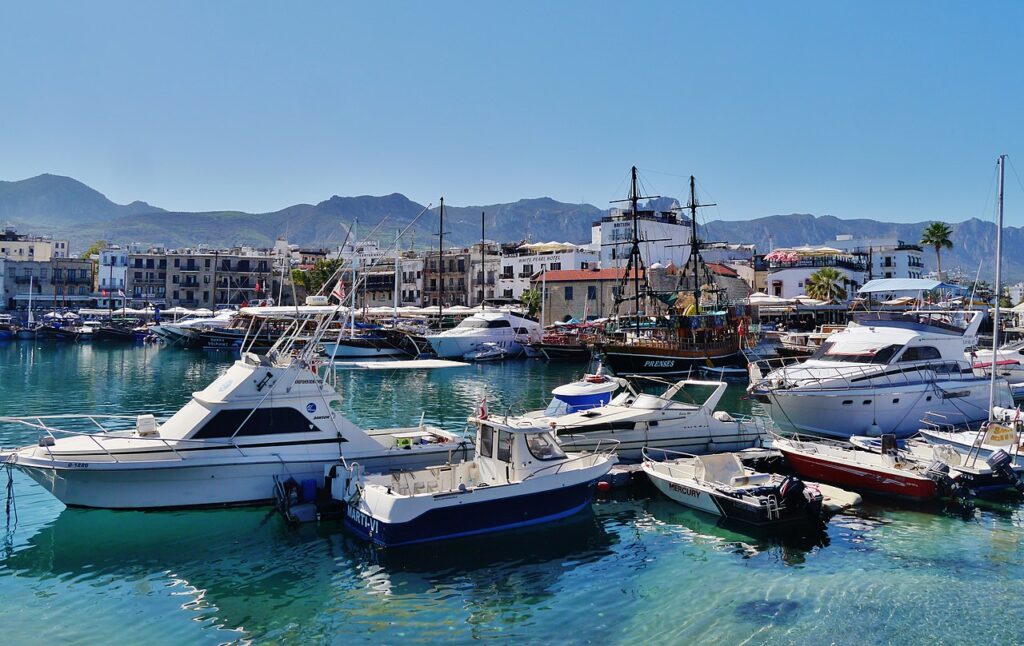
Girne harbour
Besides providing a fine setting for a range of eating places, alfresco or indoors according to season, the picturesque harbour also incorporates a number of curious relics of its ancient predecessor. The harbour is beautiful at all times of day, but is at its most bewitching at night. Many of the restaurants here are open for food all day long in high season.
The graceful horseshoe curve of Girne’s harbour has become even more tranquil since being closed to traffic by a barrier at the west end (except for a few hours in the morning to allow deliveries). A fair proportion of the buildings enclosing the harbour are Venetian, tastefully restored to shops and restaurants on their ground levels, with apartments or the owners’ accommodation above. The tourist office is itself such a restored house, with a stone vaulted interior.
Sticking out of the water among the moored fishing boats and yachts stands a semi-collapsed squat stone tower, approached by a crumbling causeway. On top is a smaller tower the size of a Roman column. This was the old chain tower, from which an iron chain was suspended across the harbour entrance to block hostile shipping. The chain, though huge, was but a tiny version of that used in Istanbul to control shipping in the Bosphorus. In the old wall that rises up behind the terrace of Café Chimera, careful observation will reveal the outline of a large Gothic archway, now blocked up. Before 1400, when the moat was still full, ships used to be dragged through this archway from the harbour into the castle moat for safety or simply for repair.
Carob Store and Cyprus House
Located right in the centre of the old harbour, next to the Set Fish restaurant, this is a museum of modest proportions but well worth a visit to see the interior of a Venetian-period warehouse. Most of its adjacent 15th-century contemporaries are now restaurants or cafés. The information signs accompanying the exhibits are of good quality and bilingual (Turkish/English).
On the ground floor there is a giant olive press and some simply enormous storage jars, most of which came from the village of Fini. So large were the jars that the potter would take the clay by donkey from the Troodos Mountains to the customer’s premises and make and bake them there. Elsewhere in the museum there is naturally plenty of information about the importance of the carob, some excellent old photos of the harbour and exhibits on regional pottery, carpentry, weaving, traditional clothing and Lefkara embroidery. There is also a film about life in 1930s Cyprus. A visit should take no more than 45 minutes.
Inland Girne
The outskirts of Girne will be familiar to most visitors simply as an area to pass through en route to somewhere else. There are few sights to detain the average tourist, but the increasing urbanisation provides a few more eating options.
From the roundabout at the southern end of Ecevit Caddesi, you can stroll in a westerly direction towards Karaoğlanoğlu. Immediately on the left is the old British cemetery, sandwiched between new commercial properties and now somewhat overgrown. Easily missed from the road, the graveyard is of little interest to anyone other than relatives and friends of those who are commemorated there. It contains a memorial to the 371 British servicemen who died in the 1955–59 conflict that preceded independence.
Continuing in the same direction, the retail outlets to both sides indicate that the consumer economy here is alive and well. You can pick up most things along here, from household appliances to ultra-stylish furniture. Should you fancy a house to go with them, you’ll be spoilt for choice among all the estate agents who have made this road their home.
At the down-at-heel Jasmine Court Hotel, you can choose to cut back towards the sea. On reaching the shore, it appears that this is an excellent shortcut back to the harbour, but don’t be tempted to walk this way. The road leads only to the military base, and although it seems that locals come and go through the barriers at will, any tourist attempting so to do will very quickly be intercepted by rifle-toting soldiers. The best way back to the harbour is to head across to Atatürk Caddesi and then bear north. In doing so, those who are self-catering should take the opportunity to visit the Karkot Organik Shop, just opposite the primary school on Inonu Caddesi. It stocks delicious pasta, dried foods, nuts, cosmetics and hygiene products, plus a huge range of organic baby foods. Note that not all the wine is organic. Vegan and gluten-free products are available, too. You will also find some of their products on sale in the larger supermarkets.
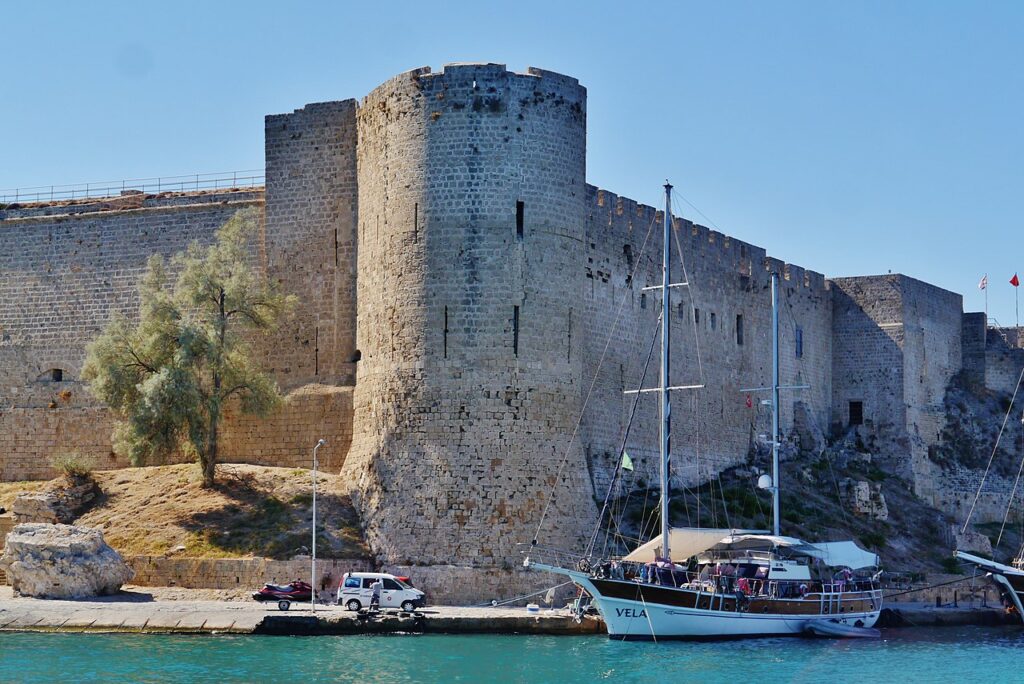
Kyrenia Castle
As you approach the castle from the harbour, the sheer power of the walls impresses. Here’s a castle that looks like a castle should. The huge round tower that confronts you is the work of the Venetians. Such fortifications were their major legacy to Cyprus, for they always regarded the island as a military outpost to protect and service their lust for trade.
Housed within the castle walls is the Girne Department of Antiquities, which took over custodianship of the castle in 1959. In some of the castle’s locked rooms the Antiquities Department is keeping icons that were collected from churches in the Girne area pre-1974 and stored here for safe keeping.
Under British rule, the castle was also used as a police barracks and training school, and as a prison for members of EOKA, the Greek Cypriot resistance movement or the Nationalist Organisation of Cypriot Fighters (Ethniki Organosis Kyprion Agoniston). EOKA formed in 1954, and from secret headquarters somewhere in the Troodos Mountains they organised a series of terrorist and sabotage attacks against British administration, to further their aim of union with Greece, or Enosis as this union was known. Pro-Enosis propaganda was concentrated in schools, where it was easy to sway feelings.
The Shipwreck Museum
Built into a couple of the great halls along the eastern wall of the castle is the much-praised Shipwreck Museum, where a 2,300-year-old Greek trading vessel is on display, together with its complete cargo. It is the oldest ship yet recovered from the seabed anywhere.
The ship was first discovered in 1965 by a Girne sponge diver some 1.5km off the coast from the castle, at a depth of 30m. Over the course of 1968 and 1969, a team of underwater archaeologists from the University of Pennsylvania Museum raised the vessel systematically from the seabed. It then took a further six years to reconstruct. Its cargo consisted of nearly 400 amphorae, mostly containing wine, from Rhodes and other places, 29 millstones, lead weights and around 10,000 almonds as food for the crew. It was these that enabled the carbon-dating of the ship. The reconstructed vessel is now in a separate temperature-controlled room.
Karpas Peninsula
The Karpas has been called the nature reserve of Cyprus, with abundant wildlife and flowers, for the most part relatively untouched by encroaching development. Remote and isolated by virtue of its geographical position, it holds itself apart from the rest of the island and almost feels like a different country. If you set out to find tranquillity in North Cyprus, then you’ll find it here or not at all.
What to see and do
To Ziyamet
The first section of the Karpas, before Ziyamet, has the largest number of sites to visit, albeit minor, and for those with the time and inclination to explore fully, there are three possible detours from the main road.
Kalecık means ‘little castle’ and by the sea just 1km short of the storage tanks are the heavily ruined 12th-century twin Templar castles of Kastros and Strongylos. A few foundations and cisterns are all that remain today, so it’s a detour only for the dedicated, especially as accessing the rock may require a paddle at high tide. Nearby is the ruined chapel of Ayios Ioannis. In the village itself, a few kilometres further north, the school is a former Byzantine church. Kalecık is the second port of North Cyprus after Gazimağusa and before Girne, used for exporting quantities of cargo, especially the tobacco grown in the Karpas, and for importing oil.
At Tuzluca, the village on the crossroads to the north, the curious used to be able to seek out a large stone in the old churchyard. The stone had a hole in the middle and local tradition held that every Easter Monday, if the married men of the village clambered through the hole, they could check that their wives had remained faithful. Any that had been cuckolded got stuck because of their ‘horns’ and, having extricated themselves, rushed off to beat their wicked spouses and begin divorce proceedings.
At Çayırova (Greek Ayios Theodhoros), the next village on the way to Ziyamet, an 8km dirt track forks south to the headland of Zeytin Burnu, Olive Cape (Greek Cape Elea). Here, to the right of the track, close to the sea, are the ruins of ancient Phoenician Cnidus set in a natural harbour. Today the ruins are scarcely visible among the ploughed fields, but the town was inhabited from the 5th century bc until the 2nd century AD.
Beyond Ziyamet
At Ziyamet (Greek Leonarisso) the character of the Karpas changes, becoming much more rural and hilly. Just beyond Ziyamet, a small town inhabited largely by mainland Turks, is a crossroads, where a fork right signposted to Gelinçik will take you, just a couple of kilometres beyond, to the monastery church of Kanakaria, in Boltaşlı (Greek Lythrangomi). This fork continues all the way to Kaleburnu and Dipkarpaz. The track going north marked on most maps between Kaleburnu and Sipahi has been replaced with a new road, so it is now possible to easily reach the north coast.
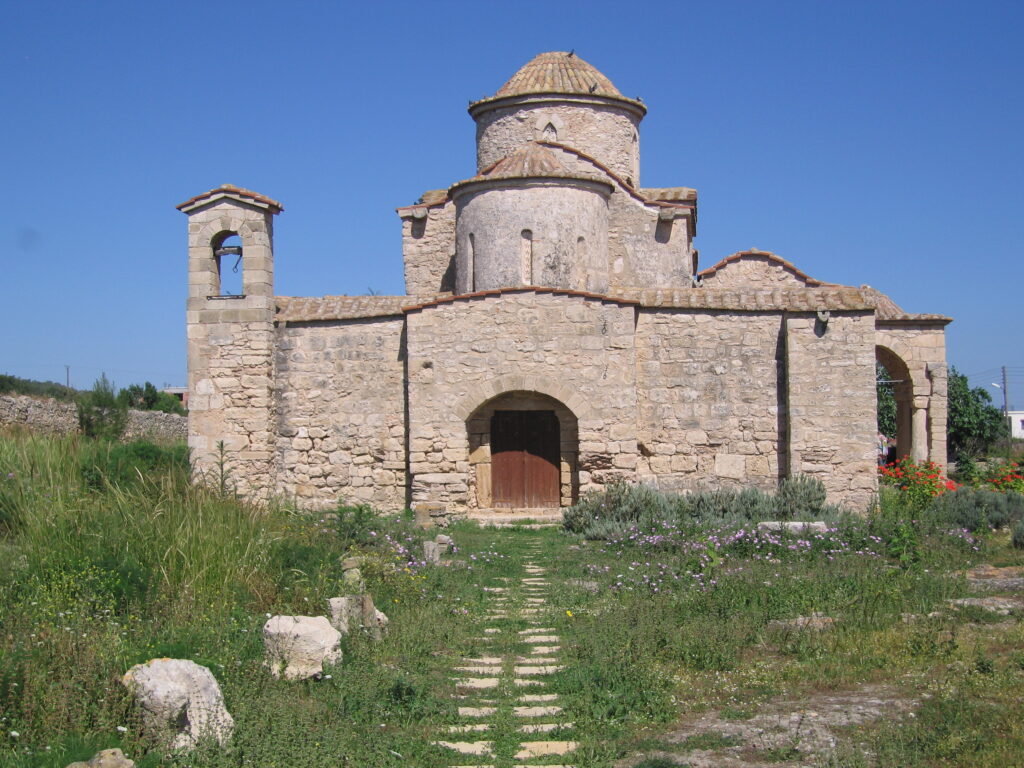
The large Byzantine monastery church of Panagia Kanakaria stands on the left of the road soon after entering Boltaşlı village. The monastery outbuildings are gradually decaying and in the graveyard round the back, three desecrated graves of the last monks have now been submerged below the weeds, behind the wall. In the semi-circular ceiling above the main entrance is a well-preserved fresco of the Virgin dated 1779. The original 11th- to 12th-century church was restored at that time, giving the church stone a (comparatively) newish look.
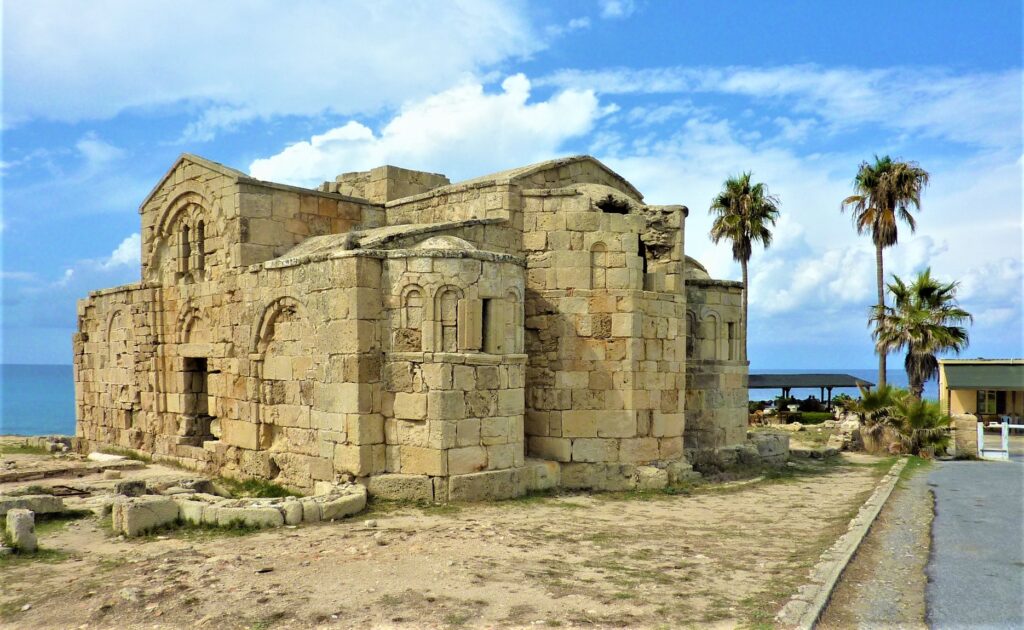
Ayios Philon
The church of Ayios Philon stands alone on the shoreline. This was the site of the ancient city of Karpasia, founded by the legendary King Pygmalion of Cyprus. It was a flourishing Christian community until the Arab raiders burnt and sacked it in 802 AD. Its inhabitants fled inland at that time and Rizokarpaso grew up. Today Ayios Philon is the spectacular location of Oasis at Ayfilon , a sustainable ecotourism venture offering simple, excellent food and rooms by the beach.
The spot is beautifully remote, with only the sound of the sea against the rocks and the twittering of the birds. The church is set on the cliffs above a rocky bay with six solitary palm trees breaking the skyline. Traces of the old harbour wall can still be seen where you swim, the large stone blocks still extending some 100m, while the remainder of the town lies hidden under the sand dunes away to the west. Philon was the name of the 5th-century bishop who converted the inhabitants of the Karpas to Christianity. The well-preserved church complete with roof is 10th century, but beside it, open to the elements, the red, white and grey mosaic pavement and column remnants belong to a 5th-century basilica, the original church of Bishop Philon. Money has been spent on renovation works and helpfully erecting trilingual signboards. Nearby are a few heavily vandalised Greek houses of this century. Walking either east or west from here will enable you to see some rugged coastline and beautiful beaches, only slightly marred by flotsam and jetsam.
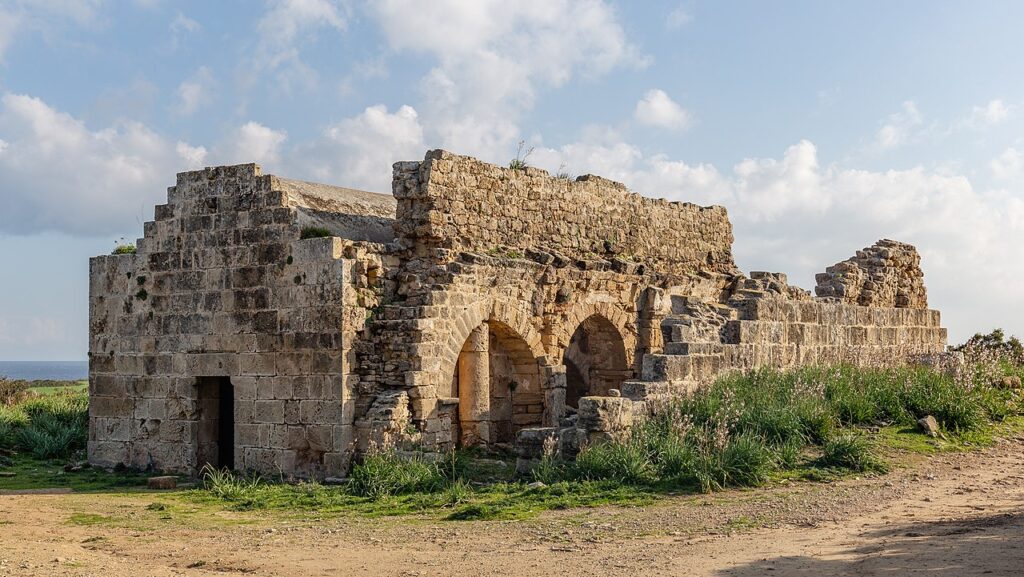
Aphendrika
Beyond Ayios Philon to the east, a dead-end, potholed, tarmac road leads to Aphendrika in just 10 more minutes. There’s no habitation at all on this stretch of coastline, and the tarmac turns into dirt track some 400m short of the Christian settlement of Aphendrika, where the shells of three churches clustered together can still be easily explored. Silent except for the birdsong and the buzzing of flies echoing in the ruined church, the spot is utterly deserted.
Strabo the Greek historian tells us that in 200BC Aphendrika was one of the six great cities of Cyprus, and the site is deceptively extensive. Apart from the three churches – Panaghia Chrysiotissa, St George and Asomatos – which date from the 12th and 14th centuries, you should also search for the citadel, set up on the hill east (inland), with many of its rooms cut into the bedrock.
Lefkoşa
Anyone who is attracted by all things Turkish should spend a day in Lefkoşa. Here, within the walls of the old city, are the island’s major Ottoman monuments, many of them either still in use or renovated (or being renovated) as museums. Apart from the renovated buildings, the town has a kind of shabby charm.
If you poke around the backstreets, particularly on a Sunday, the peace will be gently interrupted only by the sound of a caged bird, the chatter of children or an animated conversation between
persons unseen behind shuttered windows. On other days, you may stumble across a carpenter, a tailor or other craftsman, plying their trade as if caught in a time gone by.
What to see and do in Lefkoşa
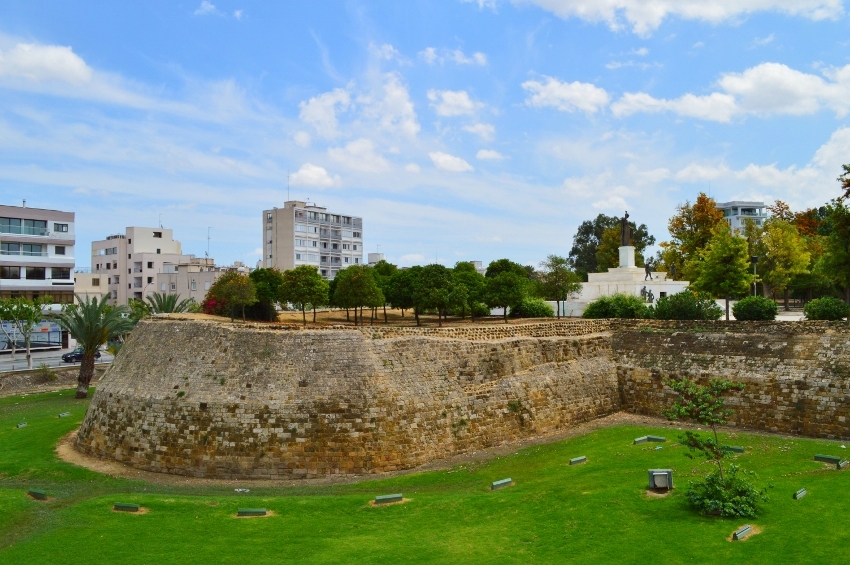
The city walls
The modern suburbs offer little to the visitor besides standard shopping, but as you approach the centre from the north, the one-way system does a wide loop and sweeps around to bring you in through the fine medieval walls at the Kyrenia (Girne) Gate, which now stands isolated like a traffic island. It looks more like a bewildered little chapel than a major gateway, as cars and trucks pass by either side of it, through the two breaches in the walls made by the British in the 1930s.
Between the gate and the Atatürk statue are a few huge iron cannons, several more of which can be found displayed in public gardens or on the ramparts. They were British, made in about 1790 at the Woolwich Arsenal, and were used in the Napoleonic wars in Egypt, later finding their way here after being acquired by the Turks.
The wide moat area below the walls was never intended for water, but rather as open space where, unprotected, the enemy soldiers could be fired at as they approached. In times of peace, the town’s dung and rubbish was tossed over the walls as natural fertiliser and good yields of corn were obtained. Today, these open spaces serve well as football grounds or public parks, or occasionally, alas, as dumping grounds.
From the air or using Google Maps they still define the outline of Lefkoşa’s walls very clearly. At regular intervals around the circumference of the walls are 11 huge bastions, six of them now in the Turkish sector, five in the Greek. Of the three fortified gates, the Famagusta Gate and the Paphos Gate, now in the southern, Greek sector, were always larger than the northern Kyrenia Gate, reflecting the relative importance of the sizes of the ports in Venetian times.
The Nicosia Trail
In a city so brutally divided by the Green Line, anyone could be forgiven for thinking that the ‘Blue Line’ was some kind of bad joke. It’s not. Somebody thought it was a good idea to paint an incongruous blue line around the streets of Lefkoşa to direct tourists from one sight to the next.
Though the blue paint has flaked off in many places, the 4.5km Nicosia Trail starts and finishes at the Kyrenia Gate and takes 1–2 hours at a gentle stroll, not allowing for time spent at sights en route. Truthfully, the old city isn’t big enough to warrant a guided path, and in any case it’s often more rewarding to find places for yourself.
Having said that, if you should get lost you can always follow the line and eventually you’llarrive at somewhere you recognise, and it could be useful if you’re short of time. In a few years, the blue line may have disappeared, unless someone repaints it; the Green Line, sadly, is likely to outlast it.
Martyrs’ Museum
From the Kyrenia Gate, follow the inside of the walls a few hundred metres to your left (east) to find the museum, the entrance to which is through a gate in what was once a restricted military area. Until recently, you had to show your passport and surrender your phone to visit, but this is no longer required.
The museum is dedicated to the battles of 1974 and the formation of North Cyprus. Many of the information labels have been translated into English to accompany exhibits that consist mainly of rifles, oil paintings and gruesome photos. A visit won’t detain you for long.
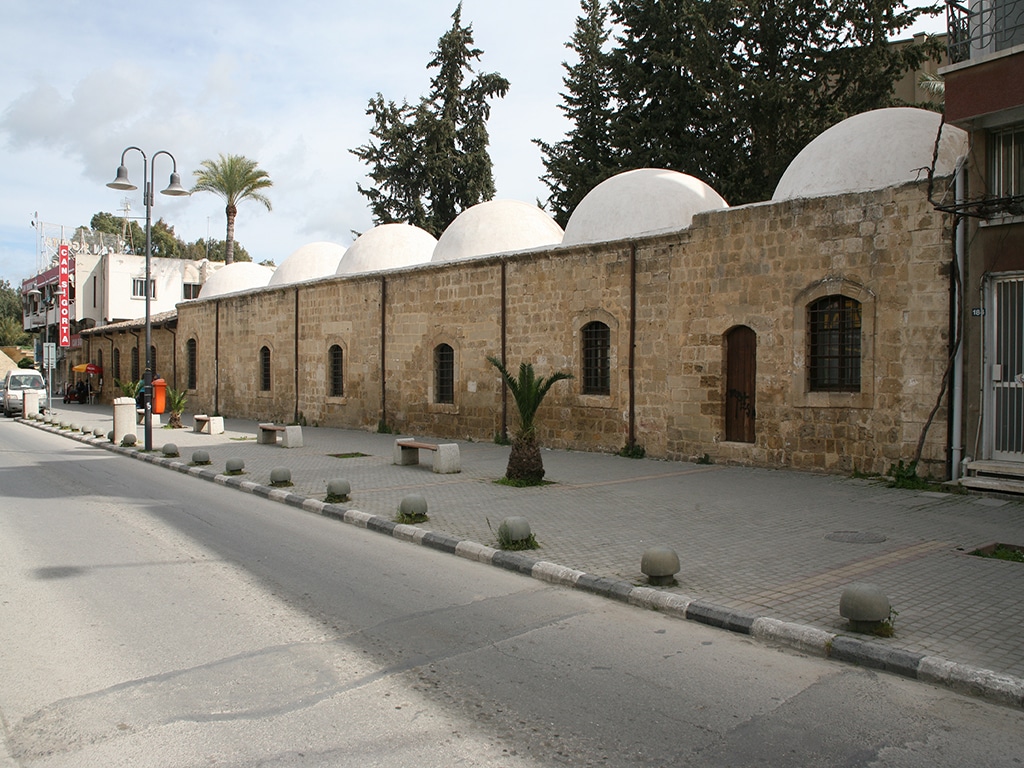
Mevlevi Tekke Museum
Returning and continuing towards the heart of the city along the main road (Girne Caddesi), you soon come to the Monastery of the Whirling Dervishes or Mevlevi Tekke Museum, dedicated to the mystic order of Islam founded by Mevlana, a Persian-Turkish poet of the 13th century. It is the only monastery of its kind on the island, and your eye will be caught by its low-rise domes immediately to your left after the roundabout just inside the Girne Gate.
The early 17th-century building was in use as the dervishes’ monastery until the 1920s, when Atatürk banned them along with other monastic orders in his determination to make Turkey a secular state. The Turkish Cypriots followed Atatürk’s policy and closed the tekke. The remaining dervishes now have their headquarters in Aleppo, Syria. Though much of the original complex was destroyed, the meeting room and part of the shrine were restored in 1963 and reopened as a museum of dervish paraphernalia.
Grand Bath
An elaborate entrance portal carved in stone is now all that survives of the church of St George of the Latins, the original incarnation of this building before the Ottomans converted it to a Turkish bath. The sunken level means that the carving on the entrance arch presents itself for a close inspection of its intriguing mix of Gothic, Italianate and Muslim elements.
In 1989 these baths were reopened as a functioning establishment, the government having rented the premises to private individuals to run, and, following yet another recent further renovation, they are once again being used by locals and tourists. Well, in theory at least: reviews are distinctly mixed and the opening times are unreliable. A shame, as this is a magnificent structure with huge potential. If they are open, however, the minimum time needed for the whole process of heating up the body and allowing it to sweat freely in the hot room is about an hour.
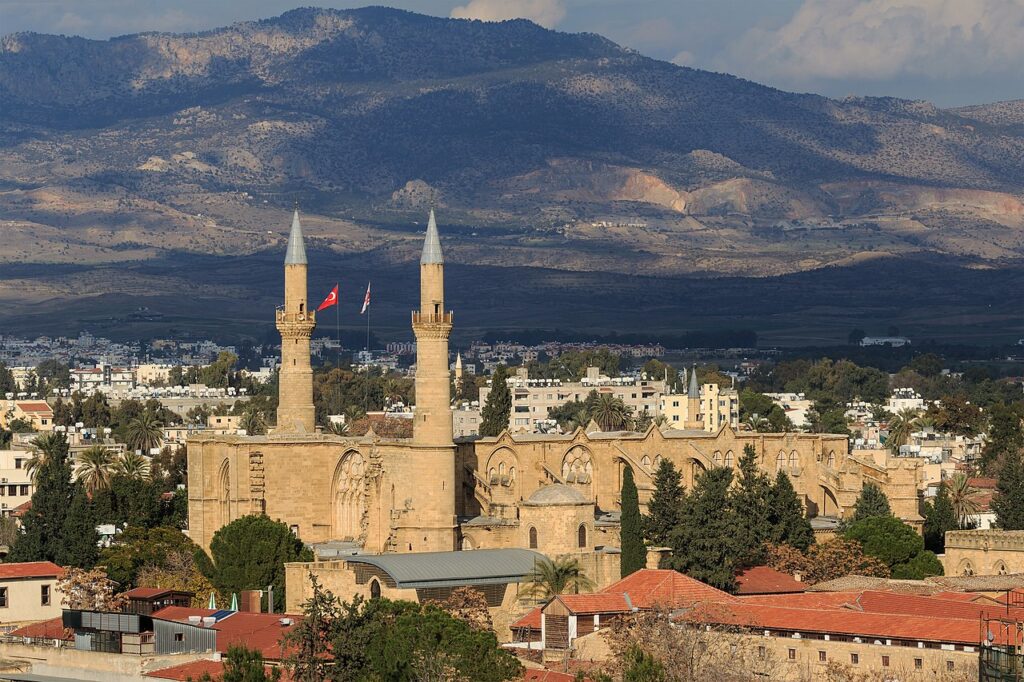
Selimiye Mosque
The Bedestan has a certain curiosity value; however, as you approach it from the Büyük Han you’ll inevitably find your attention drawn towards its more complete and magnificent neighbour, the Selimiye Mosque, once upon a time the St Sophia Cathedral.
The best place from which to survey the outside of the cathedral is the simple, almost rustic garden café, residing in a fine old two-storeyed crenellated building with Gothic windows that was once the Chapter House, and reached by walking between the cathedral and the Bedestan. This quiet spot has a superb view of the cathedral’s south wall with its flying buttresses, and gives you space to relax and appreciate the soft golden stone, harmonising with the background of the green cypress trees and the deep blue sky.
The Sultan’s Library
Directly behind the Sultan’s Library, through a pair of large wooden doors, the Lapidary Museum can be found. The guardian used to open these doors on an ad hoc basis by means of an enormous key that stretched from his wrist to his elbow, but today the museum has more customary scheduled opening times and a regular guardian to take your money. Inside this Venetian nobleman’s house, the English colonial rulers, with their love of antiquities, gathered together fragments of stonework from Lefkoşa’s ancient palaces and churches.
Salamis
Ancient Salamis, the first city of Cyprus in classical Greek times, boasts some of the most impressive monuments to be found on the island. The pleasantly overgrown ruins lie among fragrant eucalyptus and acacia trees, alongside an excellent though narrow beach, with safe swimming. Situated 6km north of Gazimağusa, it makes an easy visit and is readily accessible for anyone travelling in North Cyprus.
The area covered by the site is huge: so huge that although archaeologists began work here in 1890 and have continued intermittently throughout the last century, the site is still only partially excavated. Networks of roads run across it, none signposted, and it can be fairly easy to lose your way, and difficult to get an overview as the site is so flat. A few minutes studying the map will help.
Cars have been banned from driving through the site, so be prepared for some lengthy walking under a blistering sun. Take comfortable shoes, suntan lotion and a sunhat; the flat landscape offers precious little shade. Go well equipped with liquid refreshments, too, or else you may find yourself hallucinating that the marble basins in the gymnasium are still sparkling with cool water. If you don’t fancy walking much, don’t be put off: the main sites (the gymnasium and theatre) are right next to the entrance and car park.
The main sights
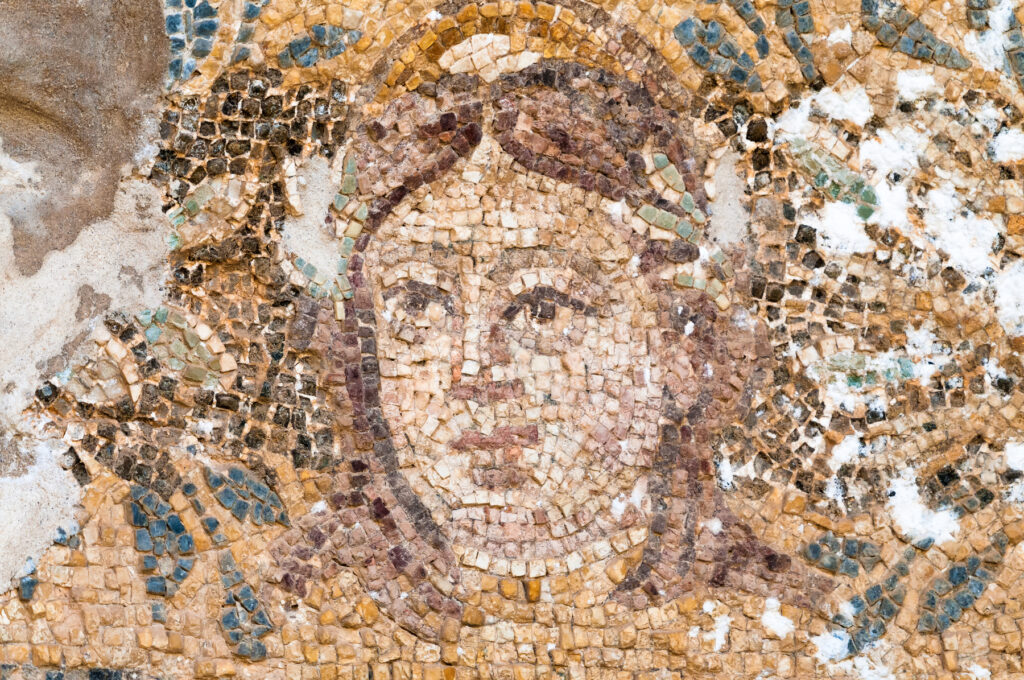
The gymnasium and baths
The gymnasium is the pearl of Salamis and the glimpse of lifestyle afforded here helps to convey, more than any other monument yet exposed, the magnificence and wealth that the city must have enjoyed in Hellenistic and Roman times. As you first enter along the marble pavements, you feel the elegant colonnaded courtyard must have been the forum, the marketplace and heart of the city, rather than simply an outbuilding devoted to education and the culture of the body, the ancient Greek version of a school and health centre. It is now thought that there were originally three gymnasia, two for boys and one for girls.
The columns of the porticoes were re-erected in the 1950s by the excavators, and on close examination the apparent harmony of the whole reveals its mixed origins, for it was destroyed and rebuilt many times in its history. In the east portico, for example, the Corinthian capitals are too small for their columns, which are taller and larger than this on the other three sides, presumably brought from somewhere else in the city by the later Byzantine builders.
The Hellenistic and Roman latrines are situated in the southwest corner of the palaestra, and are the largest on the island. Arranged in a semicircle, with open-plan seating for 44, they strike us today, with our prudishly solitary cubicles, as most improper. The puritanical Christians of the 4th century, too, considered them indecent, and had them walled up.
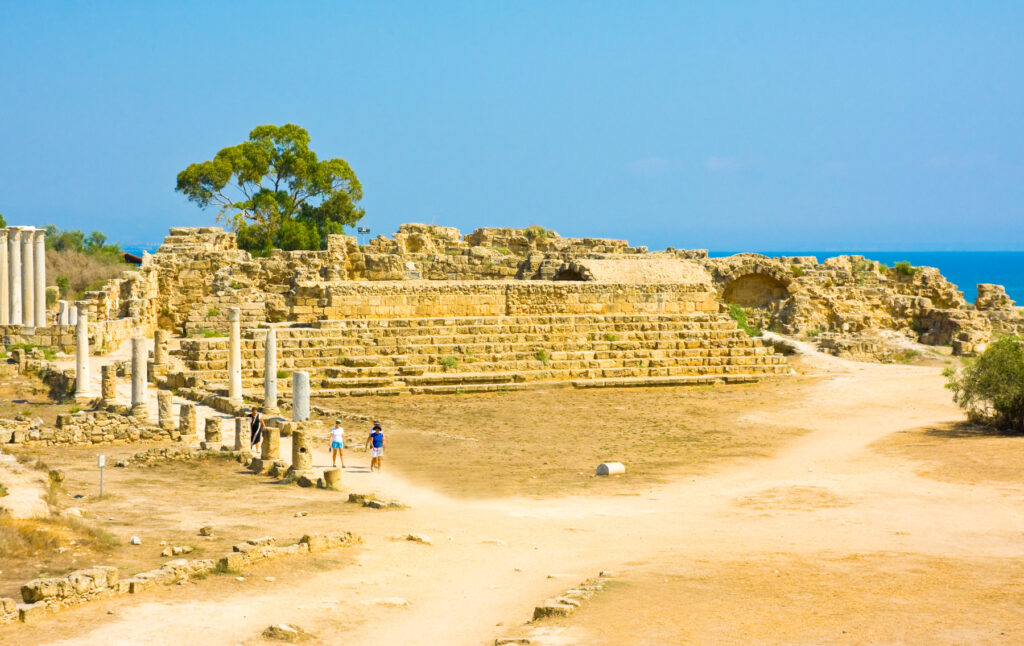
The theatre
The theatre was not discovered until 1959 and archaeologists have now rebuilt it to under half its original height, 18 of the 50 rows of seats. Of these, only the first few rows are original, and the division is clear where their white limestone casing gives way to the brown limestone used in the reconstruction. Badly damaged in the earthquakes of the 4th century, many of its original stones and decorative blocks were carted off for reuse in other buildings. The marble tiles of its orchestra, for example, were taken off to renovate the nearby baths after an earthquake.
The channel in the middle of the orchestra was the drainage for blood from animals sacrificed to Dionysus before each performance. With an original seating capacity of between 15,000 and 20,000 it is far and away the largest theatre in Cyprus, reflecting the fact that Salamis was the foremost city on the island for much of its history. Eschewing blood-letting, these days the theatre again hosts crowds for regular music and theatre performances.
The forums, basilicas and other ruins
Although the theatre and gymnasium together form the most impressive part of Salamis, there are plenty of other ruins in the area that are worth visiting. A circular tour of the other major sites can be made if you have the time (a minimum of 1½–2 hrs) and energy (to walk the 5km or so). Taking a left at every junction should ensure you cover most of Salamis.
After the gymnasium and theatre area, the next most impressive section of ruins at Salamis is to be found beside the old Roman harbour. To reach it, you head south from the theatre and fork left at the first junction of tarmac roads. Passing the sorry remains of a Roman villa, take the next left. Some 100m or so after this junction, on the left of the road, is an underground Byzantine cistern with paintings on the walls, now kept locked. The key is held by the Gazimağusa Department of Antiquities, beside the Namık Kemal prison. The cistern consists of three interconnecting chambers, in one of which are faded water scenes of fish and sea plants with a bearded Christ above. Access involves descending a ladder with torches (supplied).
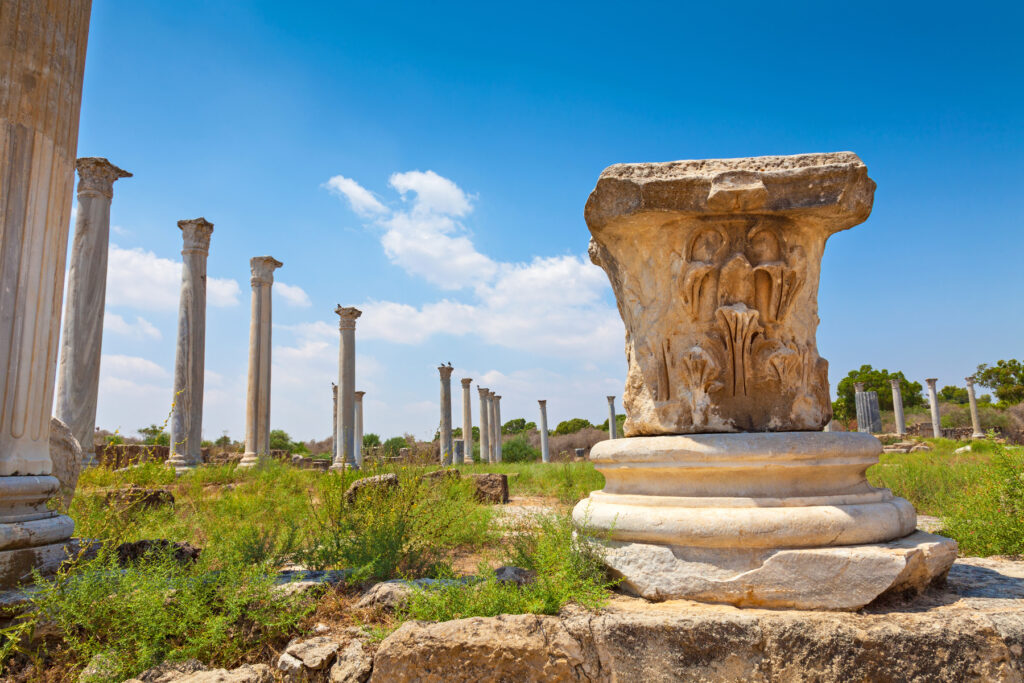
The Stone Forum, St Epiphanius and the Granite Forum
Though these last ruins are unexcavated, they remain impressive and for those with the time it is pleasant to stroll around the ancient city to find them, enjoying the gentle breeze which blows in the fragrant eucalyptus trees. In spring and early summer, the walk across the gentle rise and fall of the land, alive with the yellow blossom of acacia mimosa, is especially lovely.
Most memorable, perhaps, is the Agora or Stone Forum, thought to be the largest forum or marketplace in the entire Roman Empire, with origins going back to the Hellenistic period. On the way to the forum you will come, on your right, to the foundations of St Epiphanius, the largest basilica in Cyprus. It was built in 345 AD, just after the earthquakes, by Epiphanius, the Bishop of Constantia. Utterly devastated as it is, the church still conveys its vastness. Salamis has an important place in the early history of Christianity, and St Barnabas himself was born here.
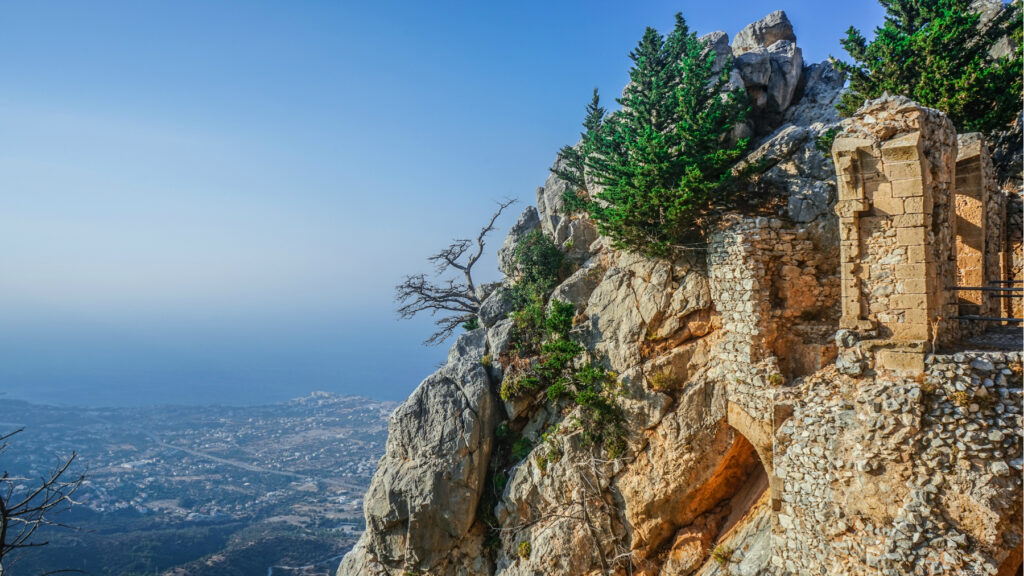
St Hilarion Castle
This gorgeous North Cyprus castle and royal summer palace make an exciting and mildly strenuous half-day trip from Girne. Dieu d’Amour was the name the Frankish knights bestowed upon it, and certainly from afar its extravagantly crenellated walls and towers tumbling over the craggy hilltop evoke a fairy-tale vision of bygone chivalry. From within, the paths and steps wind up through the three castle sections, one superimposed on the other, culminating in the royal apartments ingeniously sheltered in their own natural courtyard of rock.
Rose Macaulay, author of The Towers of Trebizond, described it as ‘a picture book castle for elf kings’, and Walt Disney is said to have used it as inspiration for the palace in Snow White and the Seven Dwarfs. Some controversy exists about which of two Hilarions the castle is named after. Although Hilarion the Great is documented as having been on Cyprus in the 3rd century, some contend that the castle is actually named after a second Hilarion, who only arrived some four centuries later.
At St Hilarion, the first section of the ascent through the castle now begins up well-laid steps and concrete paths. The main gate and outer walls were built originally by the Byzantines in the 11th century for extra defence, and these lowest parts were for the men-at-arms and the horses. In the many long sieges of medieval times this area and its cisterns were invaluable. The castle had its exposure to modern warfare too, serving in 1964 as a stronghold for Turkish Cypriots. Such were the castle’s defences, even in ruin, that a garrison of boys was able to ward off the Greek attack. The Turkish army still used the castle until relatively recently, before moving out to their camp along the ridge.
Once through the main gate, the anayol (main road) takes you up to the left. First you will see two cisterns, one to each side, as well as the former stables, which now house the ‘Introduction Section’. This is a small visual display that briefly explains the castle’s history. A few metres further on, as the path turns sharply to the right, is the corner tower. After a few minutes’ climb you reach the main gatehouse, a huge and powerful arched structure that originally closed with a drawbridge.
At the end of the gatehouse passageway, a set of steps leads up to the Byzantine church, quite well preserved and with faint traces of 12th-century paintings on the south (car park) side of the wall. Some restoration work was done here in 1959. It is larger than you would expect for a castle chapel, and this is because it belonged originally to a 10th-century monastery built here by the Byzantines to honour St Hilarion, a hermit who had fled to Cyprus from the Holy Land to escape persecution. He died here in a nearby cave.
The area all around the church was originally the monastery, and the rooms to the north and east of it were the buttery, cellars, kitchen, belvedere and castellan’s (commander’s) room. The largest room in this group was the refectory, or main hall, used in Lusignan Crusader times as a banqueting hall. It has now been restored as the modest Café 101, selling tea and coffee, soft drinks and homemade honey. The walls are currently home to an excellent display of wildflower photographs, the work of the café’s proprietor Mustafa Gürsel.
Immediately below is another series of rooms, thought to be barracks built for the 14th-century Crusader knights, which are curious in that their floors follow the contours of the natural bedrock below. Along from these, to the east, are the summer royal apartments, accessible by way of a wooden staircase.
From the refectory in the central, middle section of the castle, you now continue to the uppermost and in many ways most intriguing part: the winter royal apartments and watchtowers. The path zigzags steeply up on uneven rock steps. In the heavy rains and floods of 1968 it was washed away completely, and access to the castle summit was impossible. Just as the path begins, notice below you to the right a huge open cistern designed to collect winter rainfall.
Related books
For more information, see our guide to North Cyprus:
Related articles
Nothing found.
